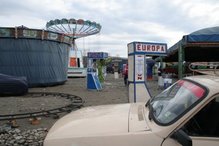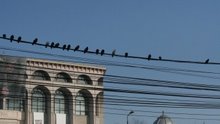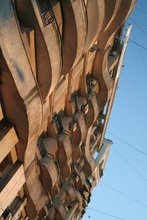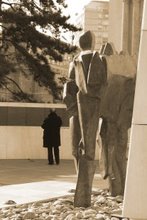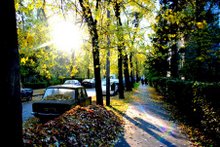In Romania, the economic pressures ‘produce’ children that are without a lot of perspectives, especially in rural areas. Not only is there very little support to ensure that the children can finish secondary school, so that for some, 8 classes effectively mean the end of the possibility of schooling. Reasons: the secondary schools are further away, and the options of commuting or staying at a family are too expensive.
Children are also the big losers of the race for jobs abroad (4 million Romanians abroad is an estimation, total population 21 million). They are left to the care of family, grandparents, or older siblings, while their parents do slave labour in Italy or Spain. There are families who are getting on better, and who do white work abroad, who have been gone longer, but those who have gone more recently, who do black work are more precarious. Of course, the parents being stressed to make a living also affects the children, and I would like to suggest that the degree to which this is happens here is higher than in the UK, for instance, even though child poverty as far as I remember is highest in Scotland as far as Western Europe is concerned.
Juxtaposition: one of these mornings, I read in the newspaper (Gindul 22.10.07) that some NGOs with programmes aimed at children in need (protection of the child I think is the technical term) had ‘lost’ billions. The National Authority for the Protection of the Child works with two main NGOs (SERA, Pentru Copii Nostri), and they were supposed to finish building, until 2006, 16 day care centres for abandoned children. In August 2007, a report showed that 4 of these were functioning. The rest do not exist, are being constructed, or have the buildings finished but without utilities. One case in Ilfov: here sheltered housing was supposed to be created for children with special needs. The building is illegal (the land not being properly put into possession), 75% of the money has been spent, and the houses are no more than a few walls, and a foundation. The responsibilities are pushed from one authority to the other…
At the moment, on private TV channel has a campaign is on entitled ‘do you know how your child is getting on?’. It is I guess aimed at sensitising people that children suffer a lot: from abandonment generally, growing up in rural areas where there are two or three children left in a village, being under considerable psychological stress, and having their options effectively limited even more. When I see these children, I get really sad and angry. You can see that they are uncared for, neglected, possibly subjected to violence, their hands are like hands of adults, rough and overworked, they don’t go to school often because they are sent to work, helping with the sunflower harvest, for instance.
I met one girl (6) who was upset all the time. You could see her anger in her face and every move she made. She had stopped speaking to everyone, including her grandmother who she lived with her during her mother’s absence. Her mother had been in Italy for a long time, and then ended up coming home having spent most of the money earned there on living.
Another girl (5) told me that children are easy to make, but difficult to raise. She said, I go to bed very late, and I cannot fall asleep without the TV. Her parents have a combined income of 60 euros. This pays just about the electricity and the firewood.
Thursday, 25 October 2007
Sunday, 21 October 2007
Let me go home…




“Another autumn day has come and gone away”
In case of overdose consult your cliche-doctor.
Sun with teeth. Corn and cabbage and carrots.
Wood clippings. Blades. Clouds.
Cold clothes dry slowly now.
I ate a walnut and thought of you.
It must be the time.
The age of wanting a home of one’s own.
Momentarily I feel heavy of decisions to be made.
Trece timpul. Zboara mintea. Trece timpul.
My mantra for the slow hours.
Constancy. Change. Constancy. Choice.
Take your pick. Autumn sale is on.
Hurry, hurry, for you might miss the deal.
Calm down your life is in your hands.
Is it? Alternative scenarios told daily.
Let us presume that
Tout est pour le mieux dans le meilleur des mondes possible.
Imi linisteste sufletul idea aceasta pana dimineata.
Adorm mai bine cu tine in gind.
I prepare the awkward homecoming dance.
M-intorc singura.
P.S. For fellow postgrads, compulsory reading here.
Labels:
nutshell-journey,
nutshell-meanderings,
research
Burden
I am still, every day, absolutely humbled by people’s generosity. I have accumulated so many debts that I better find a way to deal with the obligation incurred. But how? Those people chose to help me, even though I was and remain a stranger, they decided to include me in their activities, some of them gave me time to ask them all kinds of silly questions even though they had no direct gains from this, and, God knows, they have better, and more necessary, things to do everyday. They patiently listened to my pseudo-Romanian babble, and tried hard to understand what on earth I wanted to say. They forgave my rashness and a certain note of insistence in my voice when I forgot how little importance my project held for them. They recognised much better than I did when it was time to stop working, lest I lose my sanity. They took me to the mountains, they drank tea with me. They circulated rumours about me so I should not forget certain things about people. They gave me apples, cheese, lifts, and all kinds of other things, material and otherwise. What did I give back?
Some of them are in a precarious livelihood situation, some of them have no real other option than to emigrate. I am of precious little help to them in this regard. Questions of relevance of my work arise (again).
I find it very hard to deal with the duplicity involved in social research. People do all kinds of things with all kinds of interests. Me most of all. I better put the stuff I learnt to good use and honour the friendship I was given.
Some of them are in a precarious livelihood situation, some of them have no real other option than to emigrate. I am of precious little help to them in this regard. Questions of relevance of my work arise (again).
I find it very hard to deal with the duplicity involved in social research. People do all kinds of things with all kinds of interests. Me most of all. I better put the stuff I learnt to good use and honour the friendship I was given.
Thursday, 18 October 2007
correspondances

to correspond = to pledge (spondere) + together (co) + again (re) [from medieval Latin]
Pledge
verb
1 [ trans. ] commit (a person or organization) by a solemn promise
• [with clause ] formally declare or promise that something is or will be the case
• [ intrans. ] solemnly undertake to do something
• [ trans. ] undertake formally to give
2 [ trans. ] Law give as security on a loan
3 [ trans. ] promise to join (a fraternity or sorority)
4 [ trans. ] archaic drink to the health of.
ORIGIN Middle English (denoting a person acting as surety for another): from Old French plege, from medieval Latin plevium, perhaps related to the Germanic base of plight
Plight
noun
a dangerous, difficult, or otherwise unfortunate situation
ORIGIN Middle English : from Anglo-Norman French plit ‘fold.’ The -gh- spelling is by association with plight
verb [ trans. ] archaic
pledge or promise solemnly (one's faith or loyalty).
• ( be plighted to) be engaged to be married to.
ORIGIN Old English plihtan [endanger,] of Germanic origin; related to Dutch plicht and German Pflicht ‘duty.’ The current sense is recorded only from Middle English, but is probably original, in view of the related Germanic words
isn’t that beautiful?
Tuesday, 16 October 2007
Wave-particle duality (don’t expect any answers here…)
I was thinking about the difference between light and sound, and Ingold’s argument about the senses, light, manifestations of light, and objects, on the one hand, and sound perception on the other. Please note that I live under a regime of scarce documentation possibilities, and these are largely unaccompanied, possibly uninformed cogitations of the lone fieldworker-woman-nutshell.
I was wondering whether the fact that light, being a dual phenomenon presenting properties of both wave and particle, makes for the asymmetry I will try to explain. Sound, on the other hand, I believe has the properties only of wave, and here there is no such asymmetry.
Ingold is actually talking about things that we really compare all the time, in terms of senses of perception, but that are not actually comparable. We hear sound, but we see in light, as he put it. There is no one to one equivalence here. Vision is equally mediated than hearing, or, let me put it this way: perception is not direct, unlike some eighteenth century philosophers tried to suggest.
Three things spring to mind:
1. With our senses something is odd, as we see objects but we hear sound. I suggest this is bullshit. We see in light (medium), but we label afterwards (categorisation).
2. If you have a skilled ear, you don’t just hear sound, but categories, expressed most commonly on a scale (C, D, E, F sharp, etc). We hear in air (medium), and we label if we can (categorisation). If not, we just listen, at best, ignore, at worst. We do not have such an extensive skilling-education of the ear happening as a rule in school.
3. It shows us that we need to be careful what we are talking about. And also that Peirce and Eco got it right as far as semiotics are concerned. Yeah! My heroes never die…
Note that I haven’t solved anything as far as wave-particle duality is concerned, but that theory might be an expression of how we feel towards light. I’d love to hear what you think about this!
I was wondering whether the fact that light, being a dual phenomenon presenting properties of both wave and particle, makes for the asymmetry I will try to explain. Sound, on the other hand, I believe has the properties only of wave, and here there is no such asymmetry.
Ingold is actually talking about things that we really compare all the time, in terms of senses of perception, but that are not actually comparable. We hear sound, but we see in light, as he put it. There is no one to one equivalence here. Vision is equally mediated than hearing, or, let me put it this way: perception is not direct, unlike some eighteenth century philosophers tried to suggest.
Three things spring to mind:
1. With our senses something is odd, as we see objects but we hear sound. I suggest this is bullshit. We see in light (medium), but we label afterwards (categorisation).
2. If you have a skilled ear, you don’t just hear sound, but categories, expressed most commonly on a scale (C, D, E, F sharp, etc). We hear in air (medium), and we label if we can (categorisation). If not, we just listen, at best, ignore, at worst. We do not have such an extensive skilling-education of the ear happening as a rule in school.
3. It shows us that we need to be careful what we are talking about. And also that Peirce and Eco got it right as far as semiotics are concerned. Yeah! My heroes never die…
Note that I haven’t solved anything as far as wave-particle duality is concerned, but that theory might be an expression of how we feel towards light. I’d love to hear what you think about this!
Everyday Threads

Imagination is a beautiful, faithful, constant companion. It is maybe not the best word to describe what I mean: it is about making present what is not immediately visible to the eye. Which does not mean it does not interact with that which is visible, is moved by it, away from it. It works also, I believe, in some psychological states, independently from it. It helps to maintain connections between things and persons not present in the visible environment, being temporarily or permanently departed. It helps to build pasts and presents through memory. It can be propelled into activity through singing, dancing, talking, being quiet. The movement of beginning awareness (unreflected most of the time) can happen on the outside, the passing of a bird, the sound of a steam liner, the touch of a cat’s fur; or it happens interiorised, a memory triggers another one, seemingly unlinked to the world of perception. This is what happens in dreams. In a daydream, a funeral, desire, a fat snake moving semi-underground, coloured like a fire salamander (I kicked it, and it turned into a dog…), an army of children, and family. These were the elements (of course, also post-conceptualised). On waking up, I spun the threads and turned them into narrative, telling them to my friend. I gave them some cake to give to someone who had fixed my bike. Someone’s voice wandered over the fence, and called for Tio, who came and went to make hay with her niece the next day. She was reminded of the time she got married, years back, to a good man she learned to respect but never loved. They passed the chapel along the road, crossed themselves, thought, briefly, of those departed, and mumbled a prayer for the living.
I got used to this place. It feels like I have been here for all time, and I agree with Aino: I cannot imagine myself anywhere else either. I will miss it immensely. I followed the challenge to be tamed, for better or worse. I am still working out the implications. One thing is certain, however, despite these flights of the imagination, I will leave, in a little over three months. I am also still working out the implications of that (bloody researchers… never finished, never concluding…). Yours in all happy vagueness, fx-shell
Chassez-vous des tigres?

Come to think of it, a lot remains unexplained in Saint-Exupéry’s Petit Prince. Maybe the allegorical quality of the work makes it so timeless. This Canadian author has written a beautiful reply to the (hopefully autobiographical!) narrator’s exhortation to tell him if you hear from the prince. In the original, the title is Le Petit Prince retrouvé. Jean-Pierre Davidts characterises the traveller from the planet with the arrogant-loving rose, three volcanoes, and baobab seeds, and his pointed questions and requests ‘dessine-moi un mouton’, so well that you are really happy and warm at heart to hear from the little guy. He does talk quite a bit more than in the original. Davidts continues the story by creating a homage of kindness, in his own voice, but without forgetting how much he owes to the original. He meets, among others, an ecologist and a statistician. You will be happy to know, I am sure, that the sheep is doing well, too. Not all shall be revealed here. The work is not as much serious literature (being so dependent on intertextuality?), but it is a fitting description of our times’ madness.
Monday, 8 October 2007
1947-1957

Sorry for the suboptimal picture. The reason for the shrubbery in the foreground was a muddy quasi-vertical wall that was beyond my climbing powers (nu sunt capra!). Some people took me to this place in the forest where the last five people of the anti-communist were hiding until they were arrested. This resistance was powerful, but never managed to get international connections, and it mainly involved people hiding in the mountains in various places in Romania, lasting almost ten years, which is not a trifle, given the conditions. Four men and a woman were arrested on this spot, there was guns firing on that day, the militians were well-trained, and the resistors were mostly put into prison. The woman gave birth in prison. A lot of other people died, who were ‘innocent’ or not. Dej’s regime was more repressive than Ceausescu’s as far as number of arrests, deportations and the extent of torture were concerned. The narrative I was told was mixing historical events of the time of resistance, myth, and current events of a female lawyer having disappeared in September and being feared dead. The current twist on events is that she has been killed by her husband, some kind of rich guy with connections to mafia worlds. In this forest, I was told a story of how the resistance is remembered by some locals. You could not see the cave anymore where the people in the 1950s were hiding, because erosion has pretty much brought down part of the sandy stone, and like in so many areas in the valley, a kind of land slide has made history just a bit more silent. Back in the village, my attention is drawn to a cross in a walled garden, that has been put in memory of the resistance, and which was not received well in the village of origin of some of the last ‘partizani’. Some people there threatened to throw it in the lake, and so it was not put up in that village, but in the neighbouring ones.
Thursday, 4 October 2007
emotions

Strong emotions, I think, do not leave us, once we have gone through them. They remain. They never fade. They are merely backgrounded, to be reactivated on occasion. This is why they can appear so scary. ‘When the truth is, I miss you.’
We are all wrestling with the fractures we carry with ourselves. Nothing out of the ordinary. Life in all its messiness. Like Peter Panter (Kurt Tucholsky) has said:
“Nicht nur du allein. Nicht nur ich allein. Jeder hat, um es mit einem Wort zu sagen, die unaufgeräumte kleine Schublade, auf die jeder so stolz ist, als habe er sie ganz allein.” (Uhu, Jg. 7, Heft 9, Juni 1931, S. 72-76)
I am feverish again today, after a long time of feeling good. It blows all emotions out of proportion; it makes me fragile and wishing I was not here. I will sleep it off.
Subscribe to:
Comments (Atom)





